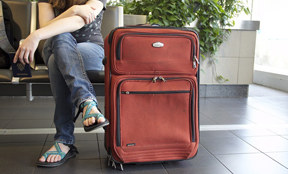
A French environmental agency has warned travellers about a toxic algae that is spreading across the country’s beaches and coastline.
l’Agence nationale de sécurité sanitaire de l'alimentation, de l'environnement et du travail (Anses) has warned people heading to the France's beaches to be aware of the agae, called ostreopsis, which can cause flu-like illness, stomach upsets and skin problems.
Here we take a look at what to look out for as Brits head across the Channel for holidays across France.
 Brits heading to France are being warned
of a toxic algae threat spreading across the country's beaches. (Credit: Pexels.com)
Brits heading to France are being warned
of a toxic algae threat spreading across the country's beaches. (Credit: Pexels.com)
What is the ostreopsis algae?
Ostreopsis is a tropical algae that first appeared in the Mediterranean Sea around 20 years ago. Around 2031, it started appearing on the Basque coast of France, and this year it has been found further up the Atlantic coast of France. This algae tends to develop in the summer, when sea temperatures surpass 20 degrees Celsius.
The Surfrider Foundation Europe has claimed that the warming of the oceans has likely contributed to the development of Ostreopsis and its spread to new regions of the globe, such as the western Atlantic coast and the Mediterranean Sea.
Is the ostreopsis a problem?
Ostreopsis is a toxic algae that can have a devastating impact on marine life and humans. It produces a
toxin that deprives marine life of oxygen, which can kill sea urchins, limpets, and other
creatures.
Ostreopsis can also cause humans to experience a variety of symptoms, including respiratory
problems, skin irritation, and nausea.
How to recognise ostreopsis in the water
French website for Brits Connexion has reported Ostreopsis can form large brown patches on the surface of the sea or ocean. These patches, known as algae "blossoms," can be several meters square. However, they can disappear quickly, so just because you don't see any patches doesn't mean Ostreopsis isn't present.
The only surefire sign that Ostreopsis is present is a metallic taste in the mouth, even if you haven't swallowed any water. This taste is caused by the toxins that Ostreopsis produces. If you experience this taste, you should seek medical attention
How do you get ill from it?
Ostreopsis can be ingested in seawater, but the main way people are exposed to it is by inhalation. The algae releases spores that can be inhaled, even if you are not in the water. This means that you can get sick from Ostreopsis even if you are just standing a few meters away from the water.
There have been reports of people getting sick after eating contaminated food outside of Europe, but there is no confirmed link between Ostreopsis and food poisoning. However, the authorities recommend not eating shellfish or other seafood if Ostreopsis is detected in the area, as a precaution.
Fish is safe to eat if it has been disembowelled before cooking. This is because the toxins typically come together in the digestive tract.
What are the symptoms of exposure and how is it treated?
Ostreopsis is a toxic algae that can cause a variety of symptoms, including flu-like symptoms, skin irritation, stomach upsets, and coughs and breathing problems. However, the symptoms are usually not serious unless you have asthma.
Symptoms typically develop within a few hours of exposure and disappear within a couple of days.
If you do not have asthma, you can treat the symptoms at home with over-the-counter medications.
However, if you have asthma or if your symptoms get worse, last beyond 3-4 days, or are accompanied by other symptoms, such as fever or difficulty breathing, you should see a doctor.
Where on the French coast is Ostreopsis most prevalent?
Ostreopsis has been spotted in small quantities along the entire Atlantic coast of France. As the temperatures increase, the authorities expect it to become more widespread.
The authorities are paying particular attention to the Nouvelle-Aquitaine region, around Bordeaux and down the Basque coast to the Spanish border. However, it has also been spotted in Brittany.
People who are in close contact with the sea or the coast are most at risk. Continued exposure can make symptoms worse.
Anses is also recommending that water checks be carried out more regularly to monitor the situation. Currently, local authorities check the water for bathing once every two weeks. However, Anses wants this to be increased to weekly
Most read travel content
Take a look at more of our top travel-related news and guides here...
-
Do I need six or three months on my passport for Spain, France and other EU countries?
-
Who can sign my passport photo... can teaching assistants sign for kids?
-
Can I carry medication on a plane - what the airlines and airports say
-
How do UK airlines keep their planes germ-free?
-
How much are fast-track security lanes at UK airports and how to book them
-
Where do I pack my vape when flying? What the airlines say
-
Can my child fly if they have chicken pox? What the airlines say
-
Can I catch monkeypox on a plane - what are the risks?
-
Full list of European countries that use the euro - and those that don't
-
What does SSSS on your boarding card mean and should you be worried?
-
Do I need a V103 certificate to drive my car abroad?
-
Do I need a new passport now I have put on weight, dyed hair, gone bald etc?
-
Get a driving licence check code for your holiday hire car
-
Find the cheapest petrol near motorways in France - interactive map
-
Are there any free drop-off points at UK airports?
-
How much does a new passport cost now we've left the EU?
-
How much are speeding fines and other driving offences in Spain? And will points go on my UK licence?
-
Can I change a name on a plane ticket and how much will it be?
-
The new speeding camera in France that 'catches everyone' - Nano Parifex revealed
-
Can I fly with a broken leg or other bone?
-
Is it possible to catch monkey pox on a plane?
-
How much are extra legroom seats on your flight - revealed here
-
Where can I charge an electric car at UK airports?
-
What airlines have defibrillators on their planes
-
What help is there for travellers with autism at UK airports?
-
Do I need to get a new passport if I move home?
Author: Pete Barden:
Twitter: @pete_barden
Pete Barden is a qualified journalist who has written and produced for publications including The Sun (thesun.co.uk), New Statesman Media Group, Whatcar? (Whatcar.com) Stuff Magazine (Stuff.tv), Fastcar Magazine (Fastcar.co.uk), Maxim Magazine and UK broadcast stations within the Heart network (Formerly GCAP). Pete specialises in motoring and travel content, along with news and production roles. You can find out more about Pete Barden on LinkedIn.











